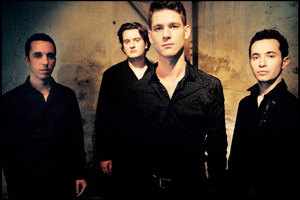by Daniel Hathaway

The members of “The Ebony Quartet,” violinists Pierre Colombet and Gabriel Magadure, violist Mathieu Herzog and cellist Raphaël Merlin, got together as an ensemble in 1999, when they were students at the Conservatory in Boulogne-Billancourt on the west side of Paris. In the next decade and a half, the quartet won important awards and acquired a reputation for moving seamlessly between different musical genres.
Their discography reflects their parallel interests: they’re recorded (sometimes with friends) chamber music by Mozart, Fauré, Brahms, Debussy, Ravel and Bartók, as well as albums with Fanny Ardant, Luz Casal, Natalie Dessay, Stacey Kent and others both live at the Folies Bergère and in the studio featuring jazz, pop and film classics.
The flip side of Quatuor ébène’s musical persona is reflected in the group’s bifurcated website which allows the reader to toggle back and forth between the classic and “l’autre ébène” as well as between French, English and German. “It’s easy to be sniffy about classical ensembles taking on popular music”, wrote the BBC’s Charlotte Gardner in a 2010 review. “That is not the case for Quatuor ébène’s Fiction though, a collection of their own arrangements of jazz, film and contemporary tracks. Equally as accomplished in jazz as they are in classical performance, the quartet has long held a dream to record a different sort of string quartet album. This is it, and it certainly is different.”
The repertory on Fiction ranges from the theme song of Quentin Tarantino’s Pulp Fiction to music by the Beatles and Somewhere over the rainbow (featuring Dessay as a credible jazz stylist). Gardner sums the recording up: “Only a very few ensembles could pull off an album like this, so one can only hope that only a very few will try.”
In an interview on the construction site of Hamburg’s new Elbphilharmonie concert hall (with a photo of the group in hard hats), Clemens Matuschek asked Quatuor ébène if playing jazz was liberating for the ensemble, encouraging the quartet to play even more freely. Pierre Colombet replied, “Yes, absolutely. When we began playing concerts with our drummer, we wondered if we could ever play classical music again. We were afraid it would destroy our technique, the subtleties of our sound. But what happened was exactly the opposite. We discovered that it helped us to feel free. And we wanted to play even more classical music afterwards, but in a new way. With less restrictions.”
Mathiew Herzog pointed out that this doesn’t mean changing what composers have written: “There is improvisation in creating new notes, and there is improvisation within the given notes. For example, we discuss a certain quartet by Mozart and talk about phrasing or dynamics. And suddenly I think: ‘Hm, this time I don’t want to play this melody forte, but a little bit less.’”
Gabriel La Magadure gave another example. “In Mozart’s d-minor string quartet, K. 421, the beginning is written sotto voce – a non-material sound, very foggy. When we played the quartet in Munich, the music critic of the Süddeutsche Zeitung was very surprised how extremely we played this effect. But we believe: When you love a composer and understand what he was trying to bring across, you can respect what he wrote and still feel free to play it the way you want.”
Colombet had the last word on that subject: “A lot of musicians are afraid of extreme contrast. They think the music is not touchable. But our goal is not to reproduce Mozart or any other composer as closely as possible. When we play the music, it becomes our music.”
On April 16 at 7:30 at Plymouth Church in Shaker Heights, Quatuor ébène will play Mozart’s Quartet in C, K. 465, “Dissonant” (watch their video of the Andante cantabile), Mendelssohn’s Quartet in f, op. 80 and Jazz and Pop Standards, “reimagined” by the quartet. The Cleveland Chamber Music Society offers a sweet ticket deal for students: only $5 at the door or online.
Published on ClevelandClassical.com April 12, 2013
Click here for a printable version of this article.



